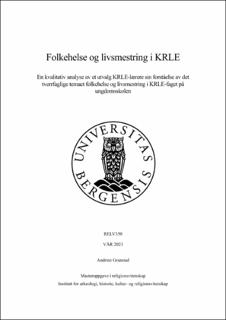| dc.contributor.author | Granstad, Andrine | |
| dc.date.accessioned | 2023-06-13T23:56:58Z | |
| dc.date.available | 2023-06-13T23:56:58Z | |
| dc.date.issued | 2023-05-30 | |
| dc.date.submitted | 2023-06-13T22:00:29Z | |
| dc.identifier.uri | https://hdl.handle.net/11250/3071225 | |
| dc.description.abstract | I 2020 ble det innført en ny læreplan i faget Kristendom, religion, livssyn og etikk (KRLE) i norsk skole. Dette skjedde som følge av fagfornyelsen, og resulterte i flere endringer i KRLE-faget. En av endringene er innføringen av det tverrfaglige temaet «folkehelse og livsmestring». Formålet med denne studien er å utforske hvordan et utvalg KRLE-lærere forstår folkehelse og livsmestring som tverrfaglig tema i KRLE. Jeg har benyttet meg av kvalitative intervju for å oppnå innsikt i dette. For å belyse funnene har jeg brukt teoretiske perspektiver hentet fra både pedagogikk og religionsdidaktikk. Analysen viser at de fleste lærerne har arbeidet med læreplanverket i forkant av læreplanimplementeringen, og at dette har hatt ulik betydning for deres forståelse av folkehelse og livsmestring. Oppgaven viser også at lærerne i hovedtrekk har to perspektiver i sin tolkning av det tverrfaglige temaet i KRLE: Et individperspektiv og et samfunnsperspektiv. Til tross for at folkehelse og livsmestring utgjør et nytt element i KRLE-læreplanen, uttrykker flere av lærerne at temaet ikke kan anses som nytt i faget. Lærerne forstår også temaets innføring i KRLE som noe som har skapt nye muligheter, men samtidig også ulike utfordringer de må håndtere i undervisningen. | |
| dc.description.abstract | In august 2020, a new curriculum for the subject Kristendom, religion, livssyn og etikk (KRLE) was introduced in Norwegian schools. This happened as a part of Fagfornyelsen – a school reformation which led to multiple changes in the KRLE-subject. One of the changes is the introduction of the new interdisciplinary topic “public health and life skills”. The purpose of this study is to gain insight into how a selection of teachers in KRLE understand the role of public health and life skills in the KRLE-subject. I have used qualitative interviews as a method and compared my findings to theoretical perspectives in both pedagogy and didactics of the study of religion. The analysis shows that most of the teachers have worked with the new curriculum before the actual curriculum implementation, which has affected their understanding of public health and life skills in different ways. Through the interviews, it becomes clear that the teachers have mainly two perspectives on public health and life skills: an individual perspective and a societal perspective. Despite being a new element in the curriculum, several teachers claim that the topic cannot be said to be a new part of the KRLE-subject. The teachers also understand the implementation of public health and life skills as an interdisciplinary topic in the KRLE-subject, as something that has created both opportunities and challenges when it comes to teaching. | |
| dc.language.iso | nob | |
| dc.publisher | The University of Bergen | |
| dc.rights | Copyright the Author. All rights reserved | |
| dc.subject | KRLE | |
| dc.subject | Folkehelse og livsmestring | |
| dc.subject | læreplan | |
| dc.subject | LK20 | |
| dc.title | Folkehelse og livsmestring i KRLE: En kvalitativ analyse av et utvalg KRLE-lærere sin forståelse av det tverrfaglige temaet folkehelse og livsmestring i KRLE-faget på ungdomsskolen | |
| dc.title.alternative | Public health and life skills in religious education: A qualitative analysis of how teachers in KRLE understand the interdisciplinary topic “public health and life skills” in secondary school. | |
| dc.type | Master thesis | |
| dc.date.updated | 2023-06-13T22:00:29Z | |
| dc.rights.holder | Copyright the Author. All rights reserved | |
| dc.description.degree | Religionsvitenskap mastergradsoppgave | |
| dc.description.localcode | RELV350 | |
| dc.description.localcode | MAHF-LÆHR | |
| dc.description.localcode | MAHF-RELV | |
| dc.subject.nus | 714218 | |
| fs.subjectcode | RELV350 | |
| fs.unitcode | 11-22-0 | |
